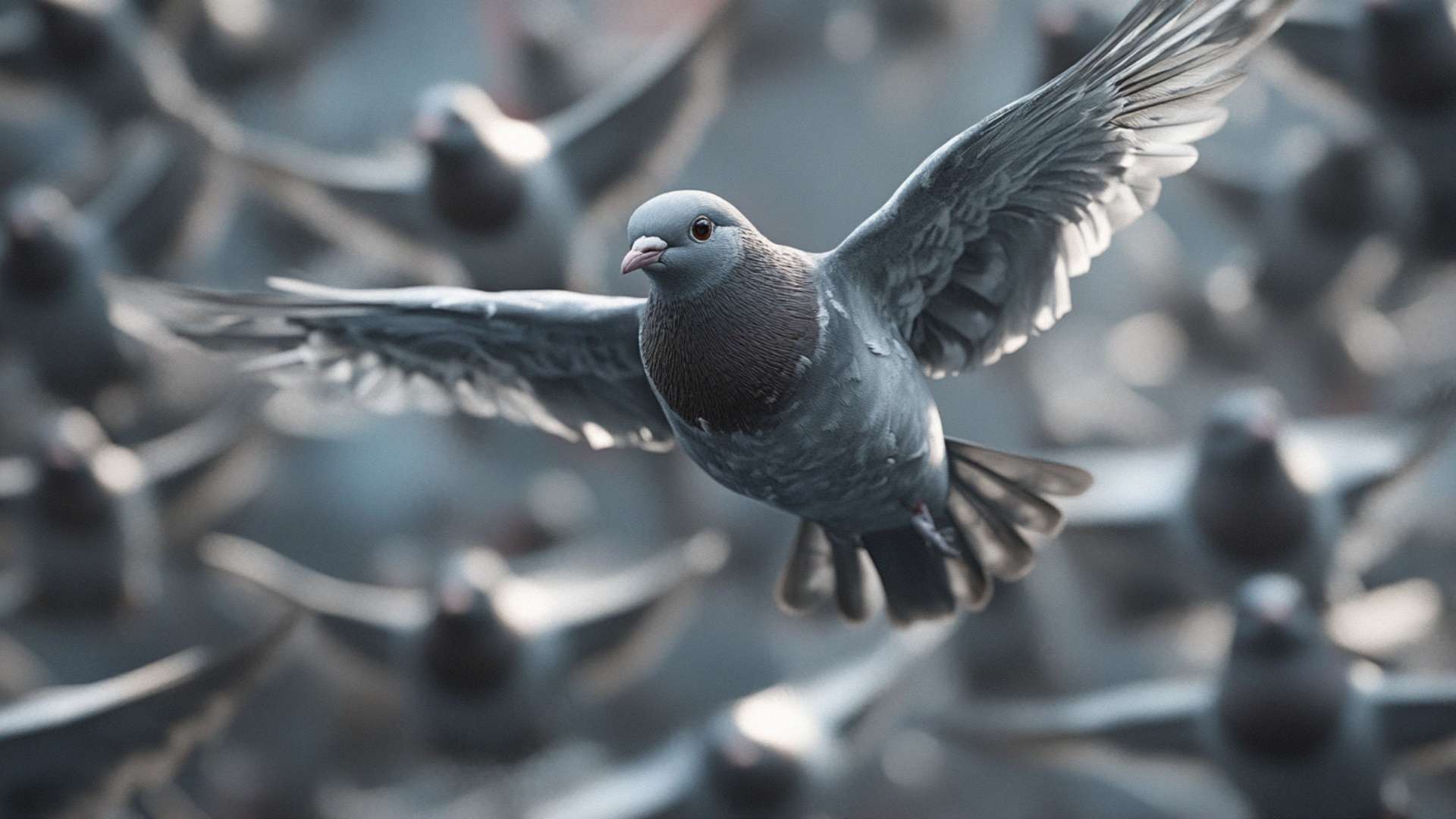Picture this: bustling city streets, towering skyscrapers, and amid the concrete jungle, a ubiquitous presence fluttering gracefully overhead. Pigeons, those seemingly ordinary birds we encounter daily, have become an intrinsic part of urban landscapes worldwide.
Their distinctive cooing and resolute strut have made them an emblematic fixture of our bustling cities. With their iridescent feathers shimmering under the sun’s rays, they captivate our attention as they navigate the urban terrain with finesse.
A Symbolic Significance Throughout History
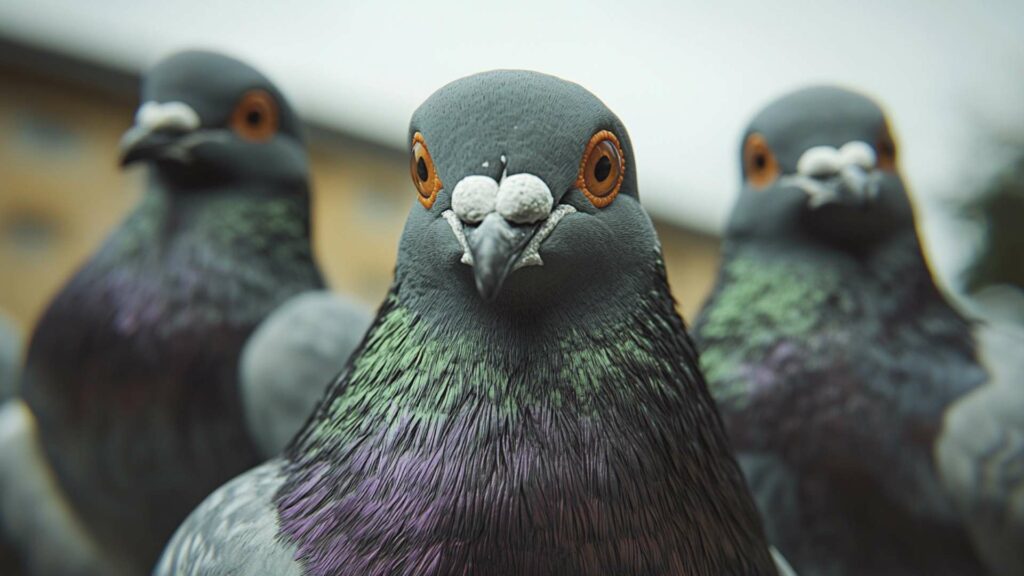
Beyond their role as familiar city dwellers, pigeons hold a profound symbolic significance that has transcended time. Throughout history, these remarkable creatures have been revered for the messages they carry both physically and symbolically.
In many cultures across the globe, pigeons are seen as a totem animal or animals representing various symbolic meanings. They are believed to serve as messengers from the spiritual realm or even guardian angels guiding us along our spiritual path.
Pigeons’ connection to the spiritual world of messages dates back centuries. In ancient times, people relied on these birds as messengers to convey vital information across vast distances – a testament to their excellent homing instincts and loyalty.
Their innate ability to return home served not only practical purposes but also held profound symbolism in delivering divine messages or revealing spiritual truths. Furthermore, pigeons symbolize peace – a concept deeply ingrained in human consciousness throughout civilizations.
Drawing parallels between pigeons and doves due to their close relation (both belonging to the same family), society has embraced pigeons as representatives of tranquility and harmony. This association can be traced back through religious texts and cultural references where white doves or pigeons are released during sacred ceremonies or times of conflict resolution.
The pigeon’s symbolism encompasses more than just conveying messages and representing peace. Their incredible adaptability in thriving amidst urban environments is seen as a metaphor for resilience in the face of adversity.
Just as pigeons navigate busy streets, dodging pedestrians and city noise, they inspire us to embrace all the challenges that life throws our way. Pigeons are more than just feathered friends we encounter daily.
They hold a profound place in human consciousness, serving as spiritual messengers, symbols of peace, and resilient beings navigating urban landscapes with elegance. As we gaze up at these enigmatic creatures soaring across the sky, let us ponder the hidden meanings they carry and strive to gain insight from their uplifting presence within our lives.
Pigeons as Messengers
Historical use of pigeons as carriers of messages
In ancient times, the historical significance of pigeons as messengers cannot be overstated. Dating back to ancient Greece and Rome, these majestic birds were revered for their exceptional ability to carry messages across long distances. Their excellent homing instincts allowed them to find their way back to their destination with impeccable accuracy.
Pigeons played a crucial role in delivering important messages during times of war, acting as lifelines between distant military outposts and command centers. During times of conflict, armies relied on pigeons to carry critical information that could turn the tide of battles.
As a result, pigeon handlers became highly respected members of military units. These skilled individuals developed deep bonds with their avian companions, nurturing their abilities and ensuring the secure delivery of vital messages.
Symbolic representation of communication and connection
The symbolic significance attached to pigeons as messengers goes beyond their practical utility. Pigeons have come to represent communication and connection in a broader sense. When we see a pigeon soaring through the sky or perched on a telephone wire, it serves as a reminder that we too possess the power to connect with others and convey our thoughts effectively.
Pigeons’ monogamous nature is also noteworthy in understanding their symbolism. Like humans, they form strong pair bonds and exhibit unwavering loyalty towards their mates.
This aspect grey pigeon also reinforces the message that relationships are built on trust, faithfulness, and open lines of communication. In addition to their physical presence, pigeons hold significant spiritual meaning for many cultures worldwide.
Considered sacred by some Native American tribes, seeing a pigeon can be interpreted as an auspicious sign—a visitation from one’s guardian angel or spirit animals even a manifestation of the holy spirit itself. The spiritual path associated with pigeons encourages us to open ourselves up to deeper connections, both with others and with our own inner selves.
They remind us to embrace the power of communication, rebuild broken relationships, and seek harmony in our lives. Whether it is a black and white pigeon, symbolizing peace or a brown pigeon representing good fortune, these birds beautifully embody the notion that effective communication can bridge gaps and foster understanding among individuals from different walks of life.
Pigeons as messengers have played a critical role throughout history. Their historical use as carriers of messages highlights their excellent homing instincts and their ability to fulfill crucial roles during times of conflict.
Beyond their practical significance, pigeons bear symbolic weight as representatives of communication and connection. They serve as reminders for us to nurture our relationships, develop strong bonds based on trust and loyalty, and embrace the power of effective communication in all aspects of life.
Pigeons as symbols of peace
The dove-pigeon connection in religious and cultural contexts
Throughout history, pigeons have been closely associated with the spirit animal peace and tranquility. This symbolism is deeply rooted in various religious and cultural beliefs.
One notable spiritual connection is between pigeons and doves, as they are often considered interchangeable symbols of peace. In Christianity, for instance, the Holy Spirit is commonly depicted as a dove descending from heaven.
This association extends to pigeons since they are closely related to doves, sharing similar physical characteristics and gentle demeanor. In addition to their religious significance, pigeons have also played a vital role in cultural symbolism across many cultures.
For example, in ancient Greek mythology, Aphrodite, the goddess of love and beauty, was often portrayed surrounded by doves or pigeons. Their presence not only emphasized her divine grace but also reinforced their association with harmony and love.
Pigeons used as symbols of peace during wartime
During times of war or conflict, pigeons have been employed as powerful symbols of peace and hope. This practice can be traced back to ancient civilizations such as Rome and Egypt when homing pigeons were used to carry important messages across long distances.
In World War I and II, these remarkable birds were trained by military forces to deliver vital information between frontline soldiers and headquarters behind enemy lines. The use of pigeons during wartime had a profound impact on people’s perception of these birds.
Pigeon messengers became emblematic figures representing communication amidst chaos—an unwavering symbol that even amid violence and destruction, the pursuit of peace remained paramount. In some instances during conflicts or after treaties were signed, releasing white doves or white pigeons became a symbolic act to signify the end of hostilities and the hope for lasting harmony.
This act served as a visual representation that human beings can transcend their differences and strive for peace, just as these feathered friends have always done. Overall, pigeons’ association with peace is not limited to any specific culture or time period.
Their symbolism as messengers and symbol of peace, tranquility and unity transcends borders and continues to inspire individuals from all walks of life. As you can see, pigeons hold a significant place in the realms of religion, culture, and human history.
Their symbolism as symbols of peace is an enduring testament to their beauty and grace. Whether seen in religious iconography, wartime messaging efforts, or cultural practices like releasing doves at weddings or events, pigeons carry a deeper meaning that resonates with our shared desire for harmony and serenity in a world often consumed by conflict.
Pigeons’ Intelligence and Adaptability
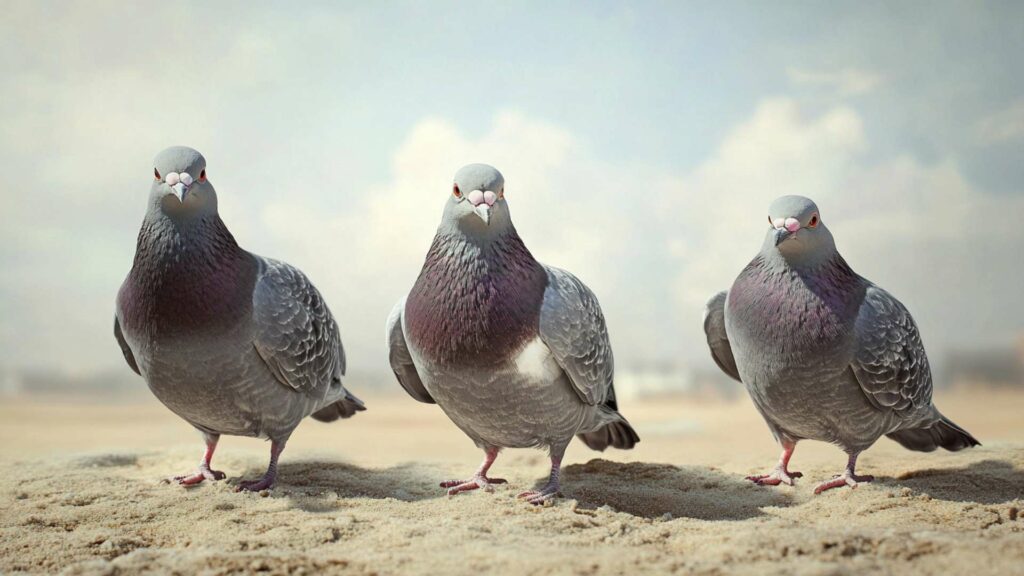
The Remarkable Cognitive Abilities of Pigeons
When we think of intelligence, pigeons may not be the first creatures that come to mind. However, these feathered friends possess surprising cognitive abilities that have fascinated scientists for years.
Pigeons are known for their exceptional learning capacities, particularly in tasks involving pattern recognition and memory recall. In fact, they have been trained to identify and differentiate between various shapes, colors, and even human faces.
This remarkable cognitive prowess places them among the most intelligent bird species. One fascinating aspect of their intelligence is their ability to navigate through complex environments using landmarks and spatial memory.
Researchers have conducted experiments where pigeons were released from unfamiliar locations far away from their nests, yet they managed to return home with astonishing accuracy. This demonstrates their excellent homing instincts and a deep understanding of their surroundings.
Adaptability: Resilience and Survival Instincts
Pigeons are true survivors, thanks to their remarkable adaptability to various environments. Originally known as rock doves, they made rocky cliffs and coastal regions their natural habitat.
However, humans created urban landscapes that attracted these birds due to the abundance of food sources. Their ability to thrive in urban settings is a testament to their resilience and resourcefulness.
Pigeons can adjust their feeding habits according to the available resources around them—whether it’s scavenging discarded food or consuming seeds from bird feeders or trees. Their flexible diet allows them not only to survive but also flourish in ever-changing environments.
Another fascinating aspect of pigeon adaptability is how they negotiate social hierarchies within flocks. While some might perceive pigeons as ordinary birds with no discernible behavior patterns, closer observation reveals a complex social structure within pigeon communities.
They form monogamous pairs and engage in elaborate courtship rituals that showcase their commitment to their partners and families. In the face of adversity, pigeons display an impressive ability to adapt and overcome challenges.
They have been known to withstand extreme weather conditions and adapt their behavior accordingly. Whether it’s finding shelter in nooks and crannies or gathering in large groups for warmth, these birds demonstrate their resilience and survival instincts.
Pigeons’ intelligence and adaptability not only contribute to their physical well-being but also hold symbolic significance. They serve as a reminder of the importance of adaptability and resilience in our own lives.
These remarkable creatures can inspire us to embrace change, navigate through complex environments, and thrive amidst adversity. By observing pigeons’ remarkable cognitive abilities and their ability to adapt, we can learn valuable lessons about our own potential for growth and transformation.
Pigeon Racing Subculture
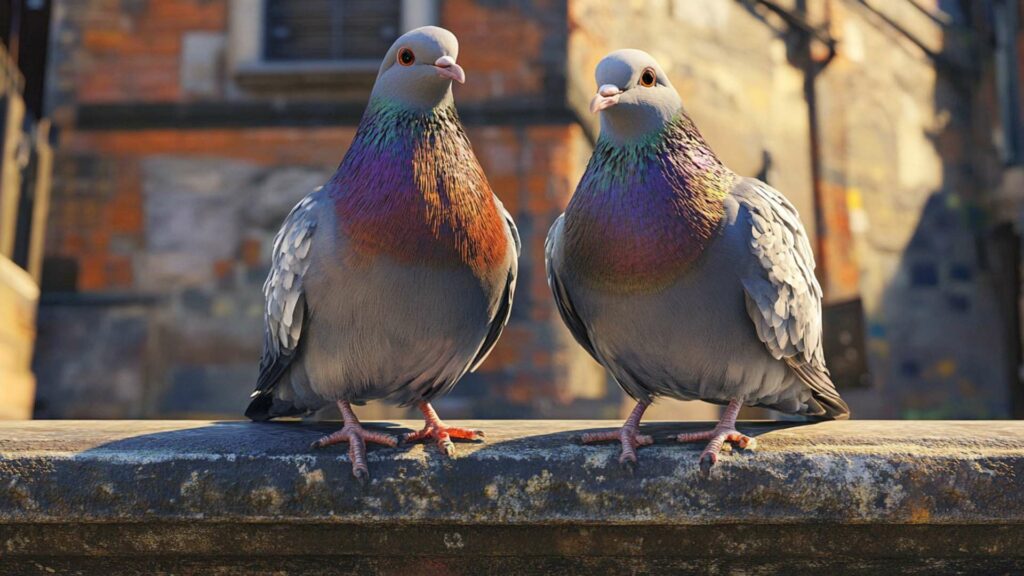
Exploration of the Competitive Sport Involving Trained Racing Pigeons
When it comes to the fascinating world of pigeon racing, it’s as if a whole new dimension opens up. Picture this: a group of highly dedicated individuals, known as fanciers, meticulously training and caring for their prized racing pigeons.
These birds are not your average pigeons you see strutting around in the park; they are carefully bred and trained athletes capable of covering vast distances with enviable speed and precision. In this subculture, pigeon racing is more than just a sport; it’s a passion that runs deep.
Fanciers invest considerable time and effort into selecting and training their pigeons, ensuring they possess the right combination of physical prowess and intelligence. The birds are trained to navigate challenging terrains over long distances, relying on their natural homing instinct to find their way back home.
Symbolism Related to Determination, Speed, and Endurance
The symbolism tied to pigeon racing reflects qualities like determination, speed, and endurance – traits that both the human competitors and the pigeons themselves embody. The sport demands unwavering dedication from its participants who push boundaries in pursuit of victory. These qualities are mirrored in the birds’ remarkable abilities as they soar through the sky with astonishing agility.
The determination exhibited by these feathered athletes is awe-inspiring. They face numerous challenges during races – unpredictable weather conditions, high winds, or even predatory threats – yet they remain steadfast in their mission to reach home first.
Their unwavering spirit is a testament to their innate resilience. Moreover, speed is an essential factor in pigeon racing.
As these magnificent creatures zip through the air with impressive velocity, spectators can’t help but admire their swift movements. Their capacity for acceleration represents a metaphorical reminder for humans that achieving one’s goals often requires pushing past limits and embracing the need for speed.
Endurance plays a vital role in this sport. Pigeon races can cover vast distances, sometimes spanning hundreds of miles.
The ability of these birds to sustain their energy over lengthy periods is nothing short of remarkable. Their endurance serves as a metaphor for the human spirit, reminding us that perseverance and stamina are key to accomplishing our own goals.
Pigeon racing goes beyond being a mere hobby; it represents a vibrant subculture that celebrates determination, speed, and endurance. Whether you’re captivated by the thrill of the race or enthralled by the symbolism intertwined with this sport, pigeon racing is an awe-inspiring display of human dedication and avian prowess.
Pigeon droppings and their symbolism
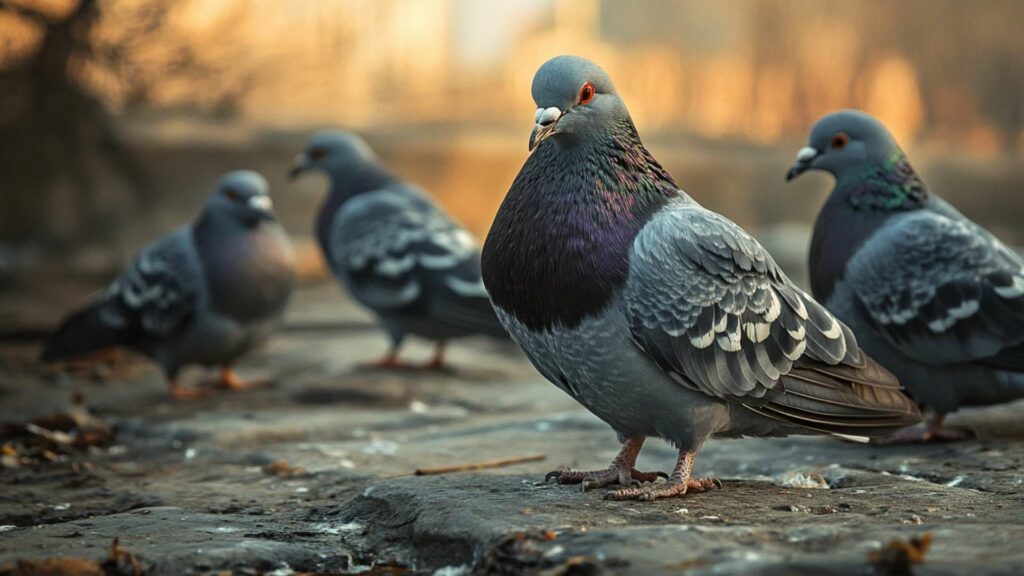
Unconventional perspective on pigeon droppings as a symbol of good luck in some cultures
In many cultures, pigeons represent, and their droppings have acquired an unconventional symbolic significance, representing good luck. It may sound peculiar at first, but this belief stems from the idea that pigeon droppings falling on you or your possessions is a sign of fortunate events to come. This notion can be traced back to ancient times when pigeons were revered as messengers of the gods.
The unexpected encounter with dead pigeon and their droppings was seen as a celestial blessing, assuring individuals that they were on the right path. Some cultures even go so far as to consider it exceptionally lucky if a pigeon drops its waste on you directly.
This peculiar occurrence is believed to bring not only general good fortune but also specific blessings relating to prosperity or success in endeavors. Therefore, it is not uncommon for people in these cultures to view such incidents with joy rather than annoyance.
Explanation on the significance attached to pigeon droppings in certain superstitions
Superstitions surrounding pigeon droppings vary across different regions and communities worldwide. One common belief is that if a person steps into fresh pigeon excrement accidentally, it signifies financial gains and unexpected windfalls heading their way.
In some traditions, it is considered auspicious if pigeon droppings fall onto your car or property because it suggests imminent wealth or business opportunities. Additionally, there are superstitions associating pigeon droppings with warding off evil forces or protecting against negative energy.
Some people believe that if a black pigeon leaves its mark on you or your belongings, it serves as a spiritual shield against malevolent influences due to the mystical properties associated with dark feathers. Overall, these beliefs showcase how ancient cultures assigned various symbolic and spiritual meanings to pigeons and their excrement.
Despite being considered unappealing by many, pigeon droppings have found an unexpected niche in the realm of superstitions, carrying with them the potential for positive outcomes and spiritual growth. While pigeons and their droppings may not immediately strike us as symbols of good luck or spiritual significance, ancient cultures have imbued them with such meanings.
Pigeon droppings being viewed as a symbol of good fortune in certain cultures is a testament to our human inclination to attach symbolism to even the most unexpected things. Whether it be through their role as messengers, their excellent homing instincts, or even their waste, pigeons continue to captivate our imagination and serve as reminders of the nuanced and diverse interpretations we can assign to the world around us.
Pigeon Symbolism in Literature, Art, and Popular Culture
A Window into the Pigeon’s Influence on Creative Works
Pigeons, with their gentle nature and remarkable symbolism, have captivated the minds of artists and writers throughout history. From classic literature to contemporary popular culture, pigeons have found a place in various artistic mediums, often carrying profound meaning. Let’s explore some notable references to pigeons in famous works and their significance.
“The Awakening” by Kate Chopin: Unveiling Freedom through Pigeons
In “The Awakening,” a groundbreaking novel of the late 19th century by Kate Chopin, pigeons make an appearance as a symbolic motif. Edna Pontellier, the protagonist who seeks liberation from societal constraints, observes a pigeon house built near her home.
The caged pigeons symbolize her desire for freedom and escape from her own confined existence. Chopin skillfully employs these birds to convey Edna’s longing for independence and autonomy.
Picasso’s Paintings: Pigeons as Messengers of Peace
Renowned artist Pablo Picasso was known for his ability to infuse his paintings with deep symbolism. In several of his works, including “La Guernica” and “Dove,” Picasso incorporated pigeons as symbols of peace.
Inspired by ancient Greece’s association between two pigeons, white doves and peace, Picasso used pigeons as messengers spreading hope amidst chaos. Through these paintings, he conveyed his yearning for harmony in a tumultuous world.
Pigeonic Pop Culture References: Animated Films & Video Games
Popular culture has also embraced the pigeon’s symbolic allure, integrating these birds into animated films and video games in imaginative ways. These references serve as a reminder of the pigeon’s universal recognition and appeal.
Animated Films: Pigeons Showcasing Wit, Charm, and Quirkiness
In animated films like “Valiant” and “Bolt,” pigeons take on prominent roles, often portraying characters with wit, charm, and a touch of quirkiness. These depictions humanize pigeons, shedding light on their intelligence and adaptability. Whether as humorous sidekicks or brave heroes, these pigeon characters contribute to the overall narrative by adding comic relief or demonstrating unexpected bravery.
Video Games: The Pigeon as an Unlikely Hero
The world of video games has also given pigeons their due recognition. In titles like “Hatoful Boyfriend” and “Untitled Goose Game,” pigeons are cast in roles that challenge traditional expectations.
As players navigate through these virtual experiences, they encounter pigeon characters that subvert stereotypes and offer unique perspectives. These games celebrate the pigeon’s versatility while inviting players to view them through a different lens.
Pigeon Behavior Patterns and Social Structure
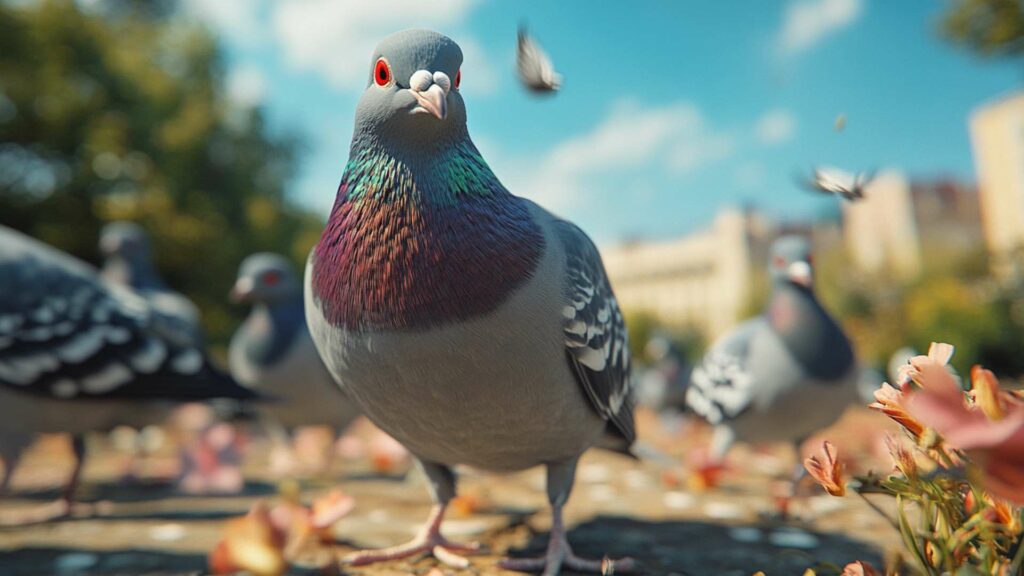
In-Depth Exploration into Pigeon Flock Dynamics
When observing a flock of pigeons, it becomes evident that they have a highly organized social structure. They form cohesive groups called flocks, which can range from a handful to hundreds of birds.
Within these flocks, there exists a clear hierarchy, with dominant pigeons assuming leadership roles. This hierarchy is established through subtle displays of dominance, such as puffing up their chests and cooing loudly to assert their authority.
Pigeons also exhibit fascinating flock dynamics during flight. Have you ever been flying pigeon and noticed how they fly in synchronized patterns, gracefully maneuvering through the air?
This remarkable coordination serves multiple purposes within the flock. It helps them defend against predators by confusing them with their swift movements and creates an efficient means of locating food sources as they communicate among themselves.
Mating Rituals and Symbolic Interpretation
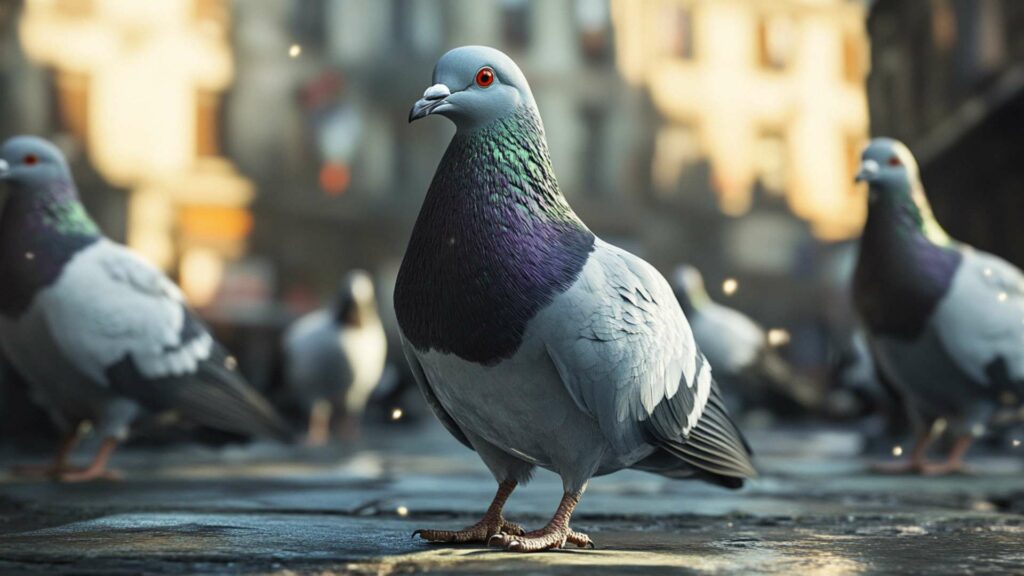
Pigeons are known for their monogamous nature, meaning they mate for life. During mating season, male pigeons engage in elaborate courtship displays to woo their potential partners. They puff up their chests, raise their wings in a distinctive pose, and engage in extravagant flights to showcase their strength and desirability.
This ritualistic behavior carries profound symbolic interpretation related to community, cooperation, and loyalty. Just like pigeons commit themselves to one partner for life, these actions reflect the importance of trust and lifelong bonds within our own human communities.
The fidelity displayed by pigeons serves as a powerful reminder that loyalty and commitment are vital components of any successful society. The symbolism associated with pigeon mating rituals also extends beyond mere reproduction; it speaks to our spiritual path as well.
Ancient cultures viewed pigeons’ monogamous behavior as an embodiment of divine love and faithfulness. In some traditions, seeing two lovebirds perched side by side was considered a spiritual sign, representing harmony and unity.
Pigeons as Symbols of Cooperation and Community
Pigeons’ social structure and flock dynamics hold symbolic interpretations that emphasize the importance of cooperation and community. As they move together in unison, pigeons teach us valuable lessons about working harmoniously with others towards a common goal.
They demonstrate that collective effort often yields greater success than individual pursuits. Additionally, pigeons’ ability to form tight-knit communities showcases their commitment to supporting and protecting one another.
Just like humans rely on their communities for strength and support, pigeons exemplify the significance of fostering strong bonds within our own communities. Their interactions remind us of the power of unity in overcoming challenges and achieving shared objectives.
Delving into pigeon behavior patterns reveals an intricate social structure characterized by flock dynamics, hierarchical relationships, and monogamous mating rituals. These aspects hold symbolic interpretations pertaining to community, cooperation, loyalty, trust, love, and unity.
By observing these feathered friends in action, we can gain valuable insights into building stronger connections within our human societies. So next time you spot a pigeon flying by or perched on a ledge nearby, take a moment to appreciate the hidden wisdom they carry within their seemingly ordinary presence.
Conclusion
Pigeons, with their ubiquitous presence in urban areas and rich history, hold a multitude of symbolic meanings across different cultures and contexts. As messengers, they represent the power of communication and connection, reminding us of the importance of staying in touch with others on our spiritual path. The dove-pigeon association highlights their role as symbols of peace, offering hope for harmony and reconciliation in a world often marred by conflict.
Additionally, pigeons’ intelligence and adaptability serve as reminders of resilience and survival instincts that can guide us on our own journey towards personal growth. In the subculture of pigeon racing, these remarkable birds become metaphors for determination, speed, and endurance.
They inspire us to push ourselves beyond our limits and strive for excellence in whatever we do. Even pigeon droppings, often seen as mere nuisances, hold surprising symbolism in various cultures as a source of good luck or positive omens.
This unconventional interpretation encourages us to find deeper spiritual meaning even in seemingly mundane aspects of life. Beyond their real-life significance, pigeons have made appearances throughout literary works and popular culture.
From Kate Chopin’s “The Awakening” to Picasso’s paintings, they have served as symbols that convey messages or represent inner struggles faced by characters. In animated films or video games too, pigeon characters add charm and playfulness while subtly referencing the qualities associated with these birds.
Exploring pigeon behavior patterns reveals an intricate social structure within flocks that emphasizes community spirit, cooperation, and loyalty. These qualities provide valuable lessons for fostering strong relationships within our own lives.
As we reflect on the various symbolic meanings attached to pigeons across different realms – from spirituality to art – let us embrace these teachings with optimism. Pigeons remind us that even amid chaos or adversity (symbolized by an injured pigeon or dead pigeons), we possess the strength to navigate life’s challenges successfully.
Their presence serves as a gentle reminder that we are on the right path towards personal and spiritual growth, offering comfort and well-being in an unpredictable world. So, the next time you spot a pigeon soaring through the sky or perched on a rooftop, take a moment to appreciate the deeper significance it holds.
These seemingly ordinary birds carry messages of hope, peace, resilience, and community spirit. Let them inspire us to embrace their qualities in our own lives as we embark on our individual journeys toward self-discovery and fulfillment.
Keep Pigeons at Bay with D-Termination: The Top Pest Control Choice in Las Vegas!

If pigeon troubles are causing you concern, look no further than D-Termination. Our team of experts specializes in deterring pigeons and reviving cleanliness and order in your space. Bid farewell to pigeons by selecting D-Termination for highly effective pest control today!
Contact us at 702-919-6310 or visit dtermination.com to arrange your pigeon control service and regain your space from these unwelcome pests.
Frequently Asked Questions:
Pigeons can symbolize various spiritual concepts, often peace and love.
Pigeons’ luck symbolism varies across cultures, so they can be seen as both good and bad luck.
When a pigeon comes near, it may simply be seeking food or is accustomed to human presence.
Pigeons hold significance in cultural and religious contexts for peace, communication, and sacrifice.

